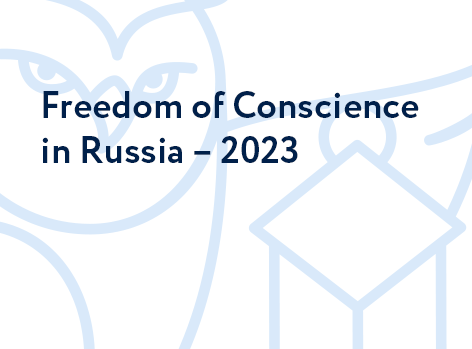The SOVA Center for Information and Analysis took part in the 2008 OSCE Human Dimension Implementation Meeting in Warsaw. We publish the text of the intervention made on October 7, 2008, by Alexander Verkhovsky at the working session "Freedom of Religion or Belief."
Honored Chairman, Ladies and Gentlemen,
Our organization monitors freedom of consciousness in Russia, and in increasing frequency we take notice of a problem (peculiar not only for our country, in our opinion) of retreat from the principle of secular state, especially, of human rights violations this retreat leads to.
In Moscow, recently, a well known human rights defender and a not less well known art expert, the organizers of the "Forbidden Art 2006" exhibition, have faced charges of incitement to religious and ethnic hatred. However, from the letter of accusation it is absolutely clear that they are actually charged of blasphemy, in particular, of insulting Christian symbols. Thereby, the prosecutor goes beyond the frame of the Russian Criminal Code, and the state as a whole - beyond its' functions given by the secular society. We could rely on the future fair court decision, but 3 years ago, there was a guilty verdict in the similar situation.
Because of the security threats coming from certain groups which call themselves Muslim, the governments watch closely the activities, including publishing and education, of any Muslim organization. It is not inappropriate thing to take measures of control, if it doesn't violate the law.
But it is inappropriate for the state officials to discuss publicly, what sorts of Islam are good and what are bad or suspicious. In fact, doing so, they protect the trends in Islam which they consider to be a traditional ones. Obviously, there is a problem of lack of knowledge of Islam among many of the officials and Mass Media.
Unfortunately, the matter goes further than such public statements. For example, the very fact of speaking in favor of Wahhabism has been repeatedly used as a reason for criminal charges. The legal basis for these accusations was that the book of the founder of Wahhabism had been forbidden in Russia. Although it is a moot point to forbid a religious treatise of the 18th century.
In a more comprehensive sense, such accusations are based on the too broad definition of extremism, which includes, among the other things, "incitement to religious discord". This provision is understood as a ban on sharp criticism towards somebody's religious views as such.
Of course, a more narrow understanding of "incitement to discord" is possible, but in this year, it is the excessively broad understanding with which we encounter more and more often.
There are attempts to close one of the regional organizations of the Jehova's Witnesses, to forbid as extremist the "Watchtower" magazine and other publications. There was even a criminal case initiated in connection to some of the material published by the Jehova's Witnesses.
Even Moscow Baptists, who had never been seen as a public security threat before, received an anti-extremist warning.
A certain website was closed by a court decision for the mere statement in one of the articles that Muslims should not celebrate No Ruz. The court considered this special confessional issue worthy of administrative prosecution.
Undoubtedly, religious texts and public statements may contain incitement to hatred against other people, and such actions are illegal in Russia and many other OSCE countries. But we should strictly differentiate between real appeals and certain opinions which can only potentially incite enmity and hatred against people. Criticism towards religious or other beliefs should be considered as only potentially dangerous.
We can and often we must call on the society to use a more tolerant language, but it contradicts to the freedom of speech principle proclaimed by the major international legal documents relevant for the OSCE region to prosecute for being intolerant towards someone else's views. Retreat from this principle as applied to the statements which concern religion illegally restricts freedom of consciousness and prejudices the secular nature of the state.
Recommendations
To OSCE/ODIHR:
1. To elaborate reference manuals for Mass Media (suitable also for the officials) on the traditions and the current trends of Islam in the countries with considerable Muslim population. These manuals, of course, should be elaborated with participation of the local experts.
To OSCE member states:
1. To define more precisely the wording of the legislation on incitement to hatred, so that any prosecution of intolerance towards someone else's views as such and especially of blasphemy could not be possible. Or to accept supplementary interpretation from the institution authorized to give interpretations of the legislation.
2. To consider as a disciplinary infraction any statements of the state officials when they concern the essence of a religion.


